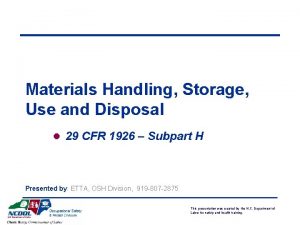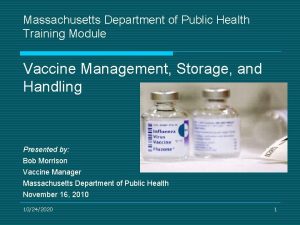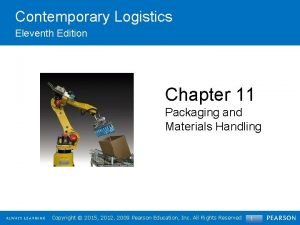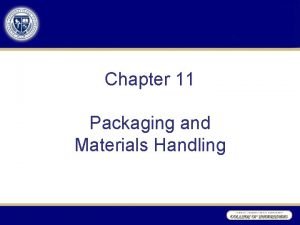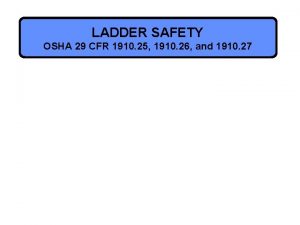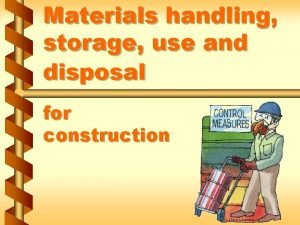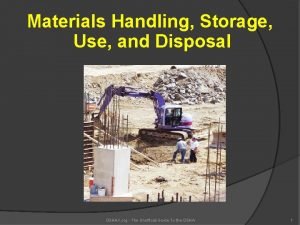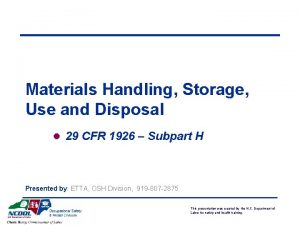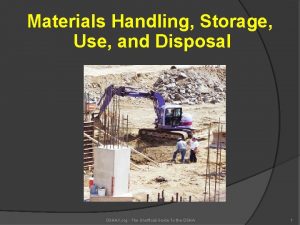Materials Handling Storage Use and Disposal OSHA 10










- Slides: 10

Materials Handling, Storage, Use, and Disposal OSHA 10 -Hour General Industry Course

Introduction The efficient handling and storing of materials is vital to any industry. These operations provide a continuous flow of raw materials, parts, and assemblies through the workplace, and ensure that materials are available when needed. But improper handling and storing of materials can cause costly injuries. Copyright© Career. Safe, LLC

Hazards Associated with Materials Handling, Storage, Use, and Disposal According to the Bureau of Labor Statistics, back injuries account for more than 20% of all occupational injuries each year. A common hazard is exceeding load capabilities of equipment, floors, or storage shelves. Other injuries include: • • Sprains, strains, and tears Soreness and pain Bruises and contusions Cuts, lacerations, punctures, crushing, and amputations Copyright© Career. Safe, LLC

Preventing Materials handling, Storage, Use, and Disposal Hazards Don't move things that are too bulky or heavy by yourself. Practice safe lifting techniques and use aids, pads, handles, or wheels to move items, if possible. To practice safe lifting, you should: • Break loads into smaller more manageable parts • Get help with heavy or bulky items • Lift with your legs, keep the back straight, and do not twist • Use handling aids, such as steps, trestles, shoulder pads, handles, and wheels • Avoid lifting above shoulder level Copyright© Career. Safe, LLC

Forklifts To operate a forklift safely, you should: • Keep your arms and legs inside the truck • Only handle stable loads • Keep your speed low in case you need to stop • Be careful when making sharp turns • Travel in reverse if your load blocks your view • Never take riders unless there is an approved seat • Only ride with the forks raised at the lowest position possible • Always wear safety belts or other restraint devices • Never turn while driving up or down a ramp or incline • Slow down and sound the horn at locations where vision is obstructed • Don’t drive up to anyone standing in front of a bench or other fixed object Copyright© Career. Safe, LLC

Forklifts continued… When going up or down an incline when loaded: Copyright© Career. Safe, LLC

Forklifts continued… When going up or down an incline when unloaded: Copyright© Career. Safe, LLC

Cranes and Slings The main crane accidents involve contact with power lines. You can reduce sling hazards by following precautions when working with slings: • Immediately remove damaged or defective slings from service • Don't shorten slings with knots, bolts, or other makeshift devices • Don't kink sling legs • Don't load slings beyond their rated capacity • Keep suspended loads clear of all obstructions • Remain clear of loads about to be lifted and suspended • Do not engage in shock loading • Avoid sudden crane acceleration and deceleration when moving suspended loads Copyright© Career. Safe, LLC

Conclusion Your employers are required to follow standards when it comes to handling materials. These include: • Comply with OSHA standards related to materials handling, including training and inspection requirements • Comply with manufacturers' requirements and recommendations for materials handling equipment Copyright© Career. Safe, LLC

Great Job! You have now completed the Materials Handling, Storage, Use, and Disposal topic. Copyright© Career. Safe, LLC
 Potential hazards
Potential hazards When disposal materials are dropped
When disposal materials are dropped Kink marks artifact
Kink marks artifact Vaccine storage and handling sop worksheet
Vaccine storage and handling sop worksheet Vaccine storage and handling protocol
Vaccine storage and handling protocol Protective packaging and materials handling
Protective packaging and materials handling Packing learning objectives
Packing learning objectives Use and care of the library
Use and care of the library 1910 ladders
1910 ladders Primary storage and secondary storage
Primary storage and secondary storage Secondary storage vs primary storage
Secondary storage vs primary storage

